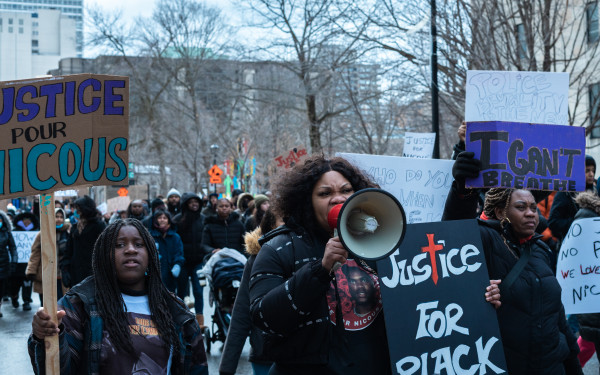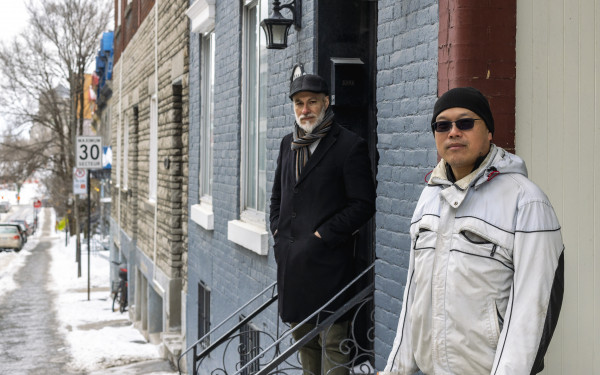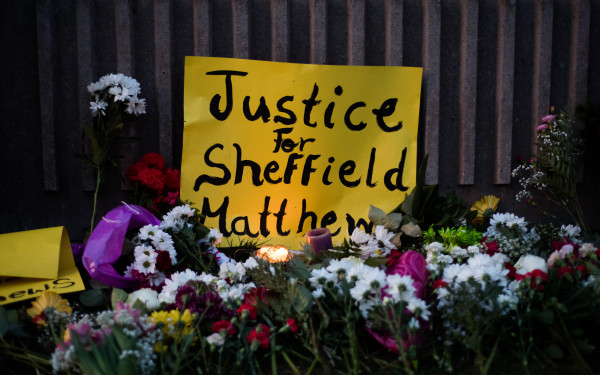Kay Family Demands Answers
Two Months After His Death, Ronny Kay’s Family Still Suffering From Police Aggression
Ronny Kay’s family has been left in the dark by authorities over further developments in the investigation into his death.
The trauma his mother and sisters have endured at the hands of the SPVM has only worsened since.
Two months have gone by since Kay’s death, and his family’s demands for transparency, accountability and justice from the police have gone unanswered.
On Sept. 17, Ronny Kay, a 38-year-old Chinese man, was shot by an SPVM officer in Nun’s Island.
Debola Kay, Ronny’s older sister, grieved the loss of her brother whose promising life was cut tragically short. “He was so young and had so many projects. He was starting to have a beautiful phase in his life, yet [the police] ended [it], so we are asking for justice,” she said.
Moments before Ronny’s death, he was working from home. He was also supposed to run errands with Debola later.
According to his family, police responded to a 911 call made by Kay’s ex-girlfriend after the two had an argument over picking up furniture. Later, Kay’s work supervisor called the police and reported he displayed signs of emotional distress.
_(1)_900_506_90.jpg)
Debola said her brother called her in a panic once police were dispatched. Ronny developed a fear of the police 11 years prior to his death, when he was apprehended by an officer during a family argument.
When Debola arrived at his home, she saw police officers and vehicles parked in front of his condo. She approached the officers, identified herself as Ronny’s sister and advised them not to harm Ronny while he was in psychological distress. SPVM officers told her Ronny was rushed to the hospital. An hour later, Ronny Kay was pronounced dead.
According to the Bureau des Enquêtes Indépendantes, the police responded to a call where a witness spotted Kay allegedly holding a weapon, possibly an imitation gun. At 12:30 p.m., an SPVM officer claimed Kay was pointing the weapon towards him. The officer then shot Kay.
Debola recounted the emotional turmoil she and her family experienced from her brother’s sudden death: “Every night, we have a hard time sleeping. There is not a single day where I don’t think of my brother [...]. That day of the tragedy keeps coming back to me because I was the last person in the family to have contacted him,” she said.
In an interview with The Link, Red Coalition Spokesperson and former police officer Alain Babineau said the police need to act on sympathy rather than violence.
“Police officers are not trained to respond to those kinds of calls [...] Police officers are trained to intervene in situations where someone’s in danger or someone is threatening the life of someone. So, I think there's a lack of training there for sure, ” he said.
“Normally, police are called in an assistance capacity, and sometimes just by family members that don't know who to turn to,” Babineau said. “Unfortunately, far too often, it ends up in the death of the individual or the use of lethal force by the police.”
“To the gunman who killed my son, I want to ask you this: do you know what human rights are?” — Ronny Kay’s Mother
Two weeks after Ronny’s death, his mother was arrested by police after an emotional breakdown at her local pharmacy. She wanted a refill of her medication before the renewal date, only to be denied by pharmacists.
After dealing with the loss of her only son and being refused medication, Kay’s mother raised her voice and slammed the counter, which prompted security staff to call the police.
Ronny’s younger sister, Michelle Kay, took a stroll around her neighbourhood when she saw police cars surround the pharmacy. She saw her mother pressed against a glass wall, after which she was handcuffed and escorted to the police station.
Michelle filmed the incident and tried to approach the officer, who allegedly threatened to tase her if she got closer to him. Kay’s mother was accused of breaching Article 129 of the Quebec Criminal Code by “obstructing the duty of a peace officer.”
Babineau said officers do not have a legal obligation and capacity to place charges. “There's nothing in the Criminal Code or penal code [where it] says police officers must arrest and charge at their discretion. This discretion is on the part of the public prosecutor,” he said.“Police officers don't lay charges, they just bring the file to the public prosecutor, who in turn, decides whether or not they're going to lay charges,” Babineau said.
“Laying criminal charges on someone that's already afflicted by post-traumatic disorders caused by the death of a loved one,” Babineau added. “That, unfortunately, doesn't speak very highly of the emotional intelligence of some of those officers.”
Two months after Ronny’s death, members of his family have been urging the BEI and the SPVM to answer why the officers shot him. Ronny’s family demands a public inquiry for his death and a coroner’s report, which has been contested by the BEI.

Debola was told by BEI officials that a report will be produced within six to nine months. In recent reports, the bureau said it is conducting an investigation on the details of Ronny’s shooting and will publish it when further developments are made.
For Ronny’s family, he has been another victim of police brutality. Since his death, his family has not received any form of apology nor updates into the investigation.
On Nov. 20, the Chinese Progressives of Quebec and the Justice for Ronny Kay Ad-Hoc Committee hosted a vigil and march in Montreal’s Chinatown, aimed to have a public coroner’s inquest, access to psychosocial services and an official apology from the SPVM.
At Sun Yat-Sen park, Kay’s sisters made speeches demanding justice for their late brother. Community organizations also attended the march and made speeches, showing solidarity.
Mandarin and Cantonese translators were alongside Kay’s sisters and key speakers from groups like the Montreal Chinese Community United Center, Chinatown Roundtable, Service à la Famille Chinoise du Grand Montréal and National Association of Japanese Canadians Quebec Chapter.
During Michelle’s speech, she read an open letter directed to government officials, including Montreal Mayor Valérie Plante, Director of the BEI Pierre Goulet, SPVM Former Interim Director Sylvie Roy, Minister of Public Security François Bonnardel and Chief Coroner Pascale Descary.
“What did [the authorities] tell us? [They told us to] ‘wait.’ [...] How can we live normally after Ronny was killed?” she asked the crowd.
More key speakers were introduced to express their condolences to Kay’s family and their frustration surrounding the death of their beloved family friend and community member.
Chinatown held a special place in Kay’s heart, giving him an opportunity to embrace and learn about his cultural heritage, as well as connect with his community through volunteering at the Montreal Chinese Community United Center’s youth program. Jimmy Chan of the Chan Family Association recounted Kay’s contribution to community groups in the neighbourhood.
“What did [the authorities] tell us? [They told us to] ‘wait.’ [...] How can we live normally after Ronny was killed?” — Michelle Kay
“There was a time when we were volunteering people to join the youth program, and Ronny was the first one [who] said: ‘Jimmy, I’ll be there for you.’ [...] He had so much potential to grow, to contribute to our society, into our humanity, but [now] he’s gone,” Chan said.
Ronny’s mother broke her two month-long silence on the death of her son. Overcome with emotion, she was consoled by PCQ President May Chiu and Michelle while she spoke through a megaphone, expressing her grief.
“Losing a child is not easy,” she told the crowd. “How could he imagine [being] gunned down just in that short moment? He was not even given the chance to come back home and talk to his mom [...] How can we, ordinary people, go to the police for help? We have many ways to handle certain circumstances instead of using weapons.”
“To the gunman who killed my son, I want to ask you this: do you know what human rights are?” she continued. “I’m wondering how we could live in a democratic society, but then we cannot find human rights.”
Social justice groups such as Coalition contre la répression et les abus policiers, the Canadian Race Relations Foundation, Conseil québécois LGBT and Coalition étudiante pour un virage environnemental et social also made statements at the march.
“We find comfort in knowing that everyone here wasn’t us reaching out, it was people reaching out to us. [...] To see people who showed up, to see who signed [the open letter], to see their faces, it means a lot to us,” Michelle said.
“For my mom, she knows that even though Ronny isn’t here physically, he has impacted so many people,” Michelle added. “It will help heal the wounds in her heart.”
A correction has been issued pertaining to some details of the events mentioned. The Link regrets this error.
This article originally appeared in Volume 43, Issue 8, published December 6, 2022.




__600_375_s_c1.png)


